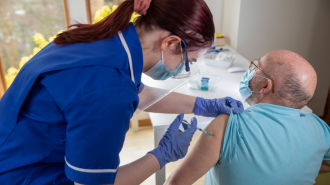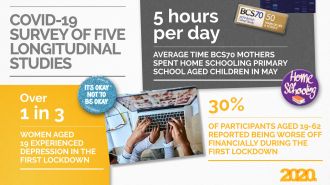
- Our studies
- Our research
- Publications and resources
- Data access and training
- About
- News
- Events
- Get in touch
- Join our mailing list

Welcome to our news and blogs section. Here you’ll find the latest developments and insights from across our longitudinal studies.
Young people from more deprived neighbourhoods have to wait up to 15 minutes longer for accident and emergency (A&E) treatment than their more advantaged peers with similar healthcare needs, according to new findings from Next Steps.
This webinar gives first-time users an insight into four internationally-renowned cohort studies run by the Centre for Longitudinal Studies (CLS).

Researchers from around the world have been using CLS study data to tackle important questions. Here is a round-up of nearly 100 new pieces of research that we’ve added to the CLS bibliography between April and June 2021.

This project aims to examine the experiences of care leavers who became parents (of cohort members) and the intergenerational impact on their children’s outcomes.

At age 17, 9% of males have carried or used a weapon, with one in four of those involved in this form of serious offending reporting they are gang members, according to UCL researchers.

Researchers can now access new information about how the COVID-19 pandemic impacted the lives of almost 28,000 cohort study participants during the third national lockdown in February and March.

Researchers from around the world have been using CLS study data to tackle important questions. Here is a round-up of over 70 new pieces of research that we’ve added to the CLS bibliography between January and March 2021.

From this summer, we hope to start catching up with our BCS70 participants to see how they’re faring in their early 50s.

As the pandemic has unfolded we have surveyed participants of five national longitudinal studies, including the 1970 British Cohort Study (BCS70) to track the effects of COVID-19 over time. Here’s a summary of our researchers’ initial findings.

Our initial findings from the Millennium Cohort Study Age 17 Sweep cover a range of themes, including mental health, obesity, substance use and antisocial behaviours.

Researchers from around the world have been using CLS study data to tackle important questions. Here is a round-up over 40 new pieces of research that we’ve added to the CLS bibliography between October and December 2020.
Ryan Bradshaw
Senior Communications Officer
Phone: 020 7612 6516
Email: r.bradshaw@ucl.ac.uk